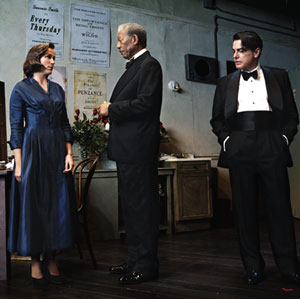Broadway has entered the home stretch of the 2007-08 season, and opening nights are coming fast and furious. I review three new shows in today’s Wall Street Journal column, The Country Girl, Les Liaisons Dangereuses, and Thurgood. All, alas, proved to be disappointments. Here’s an excerpt.
* * *
 Two of America’s best actors opened on Broadway this week in a pair of plays that don’t suit their talents. Such disappointments are a necessary part of the career of every serious artist who is brave enough to take chances, but some chances are better than others, and I wish that Morgan Freeman and Laura Linney had chosen more suitable vehicles for their long-awaited returns to the New York stage.
Two of America’s best actors opened on Broadway this week in a pair of plays that don’t suit their talents. Such disappointments are a necessary part of the career of every serious artist who is brave enough to take chances, but some chances are better than others, and I wish that Morgan Freeman and Laura Linney had chosen more suitable vehicles for their long-awaited returns to the New York stage.
Mr. Freeman, who hasn’t set foot on any stage in two decades, is starring in Mike Nichols’ revival of “The Country Girl,” one of the last plays by Clifford Odets to do well on Broadway. Written in 1950 and most recently revived there 36 years ago, it’s best known in George Seaton’s 1954 film version, which won Grace Kelly an Oscar, though it was Bing Crosby who gave the more interesting performance. Like Crosby, Mr. Freeman is playing the part of Frank Elgin, an over-the-hill actor-alcoholic who has been given one last chance to redeem himself. It’s a challenging role: Elgin starts off scared and ingratiating, then goes on a bender, at last pulling himself together and becoming the man he used to be. The trouble is that Elgin is a weak man, and weakness is not one of the more interesting colors in Mr. Freeman’s palette. Once Elgin recovers his courage in the second act, Mr. Freeman snaps into focus and starts making sense, but until then you never quite believe him….
Laura Linney has the twin gifts of simplicity and sincerity: It is impossible to doubt anything she says, whether on screen or onstage. Hence it is hard to see why she would have wanted to play the Marquise de Merteuil, the elaborately deceitful anti-heroine of “Les Liaisons Dangereuses,” Christopher Hampton’s “Masterpiece Theatre”-style stage version of Choderlos de Laclos’ 1782 epistolary novel about a pair of aristocratic immoralists who make the fatal mistake of putting their heads in a noose of their own knotting. Ms. Linney, doubtless to her credit, lacks the sharp, supercilious edge of hypocrisy without which the Marquise cannot be portrayed convincingly, and though she does all she can to simulate it, the results too often suggest a very, very smart young girl playing dress-up….
Thurgood Marshall was by all accounts a peerless raconteur, full to overflowing of blunt, salty tales about the troubles he’d seen. George Stevens, Jr.’s “Thurgood,” in which Laurence Fishburne plays the man who argued Brown v. Board of Education before the U.S. Supreme Court, then became its first black justice, shows us that side of him–and nothing more. Like most one-man shows about historical figures, it’s a shallow exercise in hagiography: Mr. Stevens’ script turns Marshall into a smug, self-satisfied storyteller whom we are invited to admire, and the fact that he did so many admirable things does not make this one-dimensional portrait any more credible, much less dramatic….
* * *
Read the whole thing here.
Archives for May 2, 2008
TT: Almanac
“This was a time in which you were always meeting people who caught politics just as a person catches religion. It was probably the last time in this century when politics in our country will be evangelical, and if a man was once intensely religious, he was bound to be wide open to a mood like that of the Thirties. But why waste time explaining the pattern? It is obvious now, and dozens of books have been written about it. Less obvious have been some of the attendant passions that went along with this neo-religious faith. Passion has a way of spilling over into all aspects of the human mind and feelings. It is the most dangeorus thing in the world whether it focuses itself on love, religion, reform, politics or art. Without it the world would die of dry rot. But though it creates it also destroys. Having seldom been its victim I have only pity for those who are, and I would be a hypocrite if I judged them by the standards you can safely apply to a man at peace with himself and his circumstances.”
Hugh MacLennan, The Watch That Ends the Night
